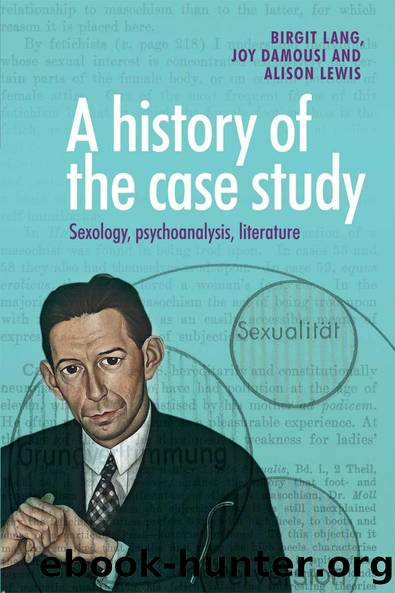A history of the case study by Birgit Lang Joy Damousi Alison Lewis

Author:Birgit Lang, Joy Damousi, Alison Lewis [Birgit Lang, Joy Damousi, Alison Lewis]
Language: eng
Format: epub
ISBN: 9781526124098
Google: eiYxtAEACAAJ
Publisher: Manchester University Press
Published: 2017-01-15T22:14:27+00:00
4
Erich Wulffen and the case of the criminal
Birgit Lang
In 1927, the leading illustrated weekly Berliner Illustrirte Zeitung (BIZ) introduced its readers to the twenty-one most influential German criminologists of the day. Each was represented by a portrait photograph and a caption. The result was an iconography of experts in the burgeoning fields of studying, solving and writing about crime and criminals. Among the select group was Dr Erich Wulffen (1862â1936), Head of Department in the Saxon Ministry of Justice.1 The photo essay describes Wulffen as the author of several criminological works on sex crime. Actually, the former state prosecutor can be considered Wilhelmine Germanyâs first legal expert; with reference to Reiner Grundmann and Nico Stehrâs definition of such an expert, Wulffen was undoubtedly a broker of knowledge between specialist discourse and the wider public in modern society.2 In addition, Wulffen wrote creative fiction on criminal psychology and legal reform.
During Wulffenâs lifetime his published oeuvre included an unprecedentedly wide range of interdisciplinary cases: his case study compilations integrated sexological, psychiatric, psychoanalytic and anthropological insights to broaden the legal understanding of criminality. Through these compilations, Wulffen targeted the milieus of the court, the university and professionals within the penal system, but also the educated public. As a broker of knowledge between the law and the German people in the Wilhelmine and Weimar periods, Wulffen deserves special credit for shaping two new case modalities: the expert case and the case story. Wulffenâs expert case studies relied on his privileged position and expertise to communicate new academic insights to the reading public. Wulffenâs case stories were conceived as creative works of fiction with the purpose of illustrating certain criminal psychological insights gained in his academic work.
This chapter represents the most in-depth scholarly engagement with the breadth and nuance of Wulffenâs case writings, and explores the intellectual contexts and case writing traditions that influenced Wulffenâs use of case modalities: his humanist education, the cases and case writing traditions of the legal profession and forensics, and, most importantly, the role of the legal reform movement. Further, this chapter contextualises Wulffenâs case writings in relation to his wider emancipatory project of educating a range of publics about the psychology of criminals â part of his attempt to further societyâs understanding of the criminal mind. Wulffen cleaved to his pedagogical project across the divide of the First World War, his sustained use of the case study genre defined by an ability to adapt case writings to particular audiences in Wilhelmine Germany. The period of the Weimar Republic proved more challenging to his larger project and to preserving the authority of what turned out to be a genre in crisis.
Like the fellow experts featured in the news magazine, Wulffen was a modern German mandarin. Fritz Ringer originally used the term âmandarinâ to reference the conservative nature of Germanyâs academic and legal elite, yet Wulffen was part of an overlooked group of legal reformers who sought to change the legal system from within.3 This progressive German intellectual elite aimed to
Download
This site does not store any files on its server. We only index and link to content provided by other sites. Please contact the content providers to delete copyright contents if any and email us, we'll remove relevant links or contents immediately.
Parents as Care Managers by Gillian Bridge(720)
The Tapestry of Memory: Unraveling the Threads of the Mind by Bittner Karis & Chianese Gabriella & Priede PhD David L(653)
Lucid Dying by Sam Parnia(589)
So Young, So Sad, So Listen: A Parents' Guide to Depression in Children and Young People by Philip Graham Nick Midgley(551)
Prepare the TCM License exam in a month Vol. 3: Acupuncture theory - channels, points, techniques and treatments(California, NCCAOM, Canadian exam) by Woosen Ur(509)
Vital Signs by Izzy Lomax-Sawyers(465)
IVF Got This by Colette Centeno Fox(420)
Information and Communication Technology (ICT) Frameworks in Telehealth by Mamta Mittal Gopi Battineni(406)
Oxford Textbook of Global Public Health by Roger Detels;Quarraisha Abdool Karim;Fran Baum;Liming Li;Alastair H Leyland;(388)
The Censorship of Second Opinions: How the politics of "misinformation" captured healthcare during the Covid-19 pandemic by Ariel Herron(355)
How Data Happened by Unknown(311)
Introduction to Social Work Practice : A Practical Workbook by Herschel Knapp(309)
Selective Oxidation Catalysts Obtained by the Immobilization of Iron (III) Porphyrins on Layered Hydroxide Salts by Fernando Wypych Shirley Nakagaki & Guilherme Sippel Machado(307)
Wilderness and Survival Medicine by Ellis Chris Breen & Dr Craig(306)
Case Studies in Adult Intensive Care Medicine by Daniele Bryden(297)
Eating and Growth Disorders in Infants and Children by Joseph L. Woolston(296)
Boxed Set 1 Dermatology by Dr Miriam Kinai(281)
Governing Habits: Treating Alcoholism in the Post-Soviet Clinic by Eugene Raikhel(269)
Manufacturing Social Distress by Robert W. Rieber(268)
